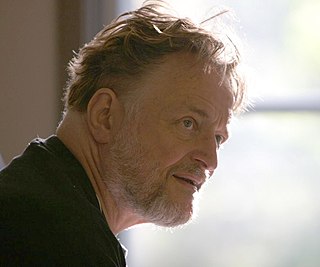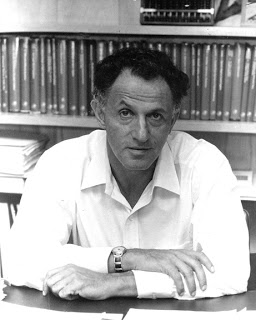
Eugene Paul "E. P." Wigner was a Hungarian-American theoretical physicist and also contributed to mathematical physics. He received the Nobel Prize in Physics in 1963 "for his contributions to the theory of the atomic nucleus and the elementary particles, particularly through the discovery and application of fundamental symmetry principles".

George Bernard Dantzig was an American mathematical scientist who made contributions to industrial engineering, operations research, computer science, economics, and statistics.

John Horton Conway was an English mathematician active in the theory of finite groups, knot theory, number theory, combinatorial game theory and coding theory. He also made contributions to many branches of recreational mathematics, most notably the invention of the cellular automaton called the Game of Life.

Richard Ewen Borcherds is a British mathematician currently working in quantum field theory. He is known for his work in lattices, group theory, and infinite-dimensional algebras, for which he was awarded the Fields Medal in 1998.

Richard Manning Karp is an American computer scientist and computational theorist at the University of California, Berkeley. He is most notable for his research in the theory of algorithms, for which he received a Turing Award in 1985, The Benjamin Franklin Medal in Computer and Cognitive Science in 2004, and the Kyoto Prize in 2008.

Raoul Bott was a Hungarian-American mathematician known for numerous basic contributions to geometry in its broad sense. He is best known for his Bott periodicity theorem, the Morse–Bott functions which he used in this context, and the Borel–Bott–Weil theorem.

Shiing-Shen Chern was a Chinese-American mathematician and poet. He made fundamental contributions to differential geometry and topology. He has been called the "father of modern differential geometry" and is widely regarded as a leader in geometry and one of the greatest mathematicians of the twentieth century, winning numerous awards and recognition including the Wolf Prize and the inaugural Shaw Prize. In memory of Shiing-Shen Chern, the International Mathematical Union established the Chern Medal in 2010 to recognize "an individual whose accomplishments warrant the highest level of recognition for outstanding achievements in the field of mathematics".

James Andrew Broun-Ramsay, 1st Marquess of Dalhousie, also known as Lord Dalhousie, styled Lord Ramsay until 1838 and known as The Earl of Dalhousie between 1838 and 1849, was a Scottish statesman and colonial administrator in British India. He served as Governor-General of India from 1848 to 1856.

Richard Dagobert Brauer was a leading German and American mathematician. He worked mainly in abstract algebra, but made important contributions to number theory. He was the founder of modular representation theory.

Richard Ernest Bellman was an American applied mathematician, who introduced dynamic programming in 1953, and made important contributions in other fields of mathematics.

Richard Kenneth Guy was a British mathematician. He was a professor in the Department of Mathematics at the University of Calgary. He is known for his work in number theory, geometry, recreational mathematics, combinatorics, and graph theory. He is best known for co-authorship of Winning Ways for your Mathematical Plays and authorship of Unsolved Problems in Number Theory. He published more than 300 scholarly articles. Guy proposed the partially tongue-in-cheek "Strong Law of Small Numbers", which says there are not enough small integers available for the many tasks assigned to them – thus explaining many coincidences and patterns found among numerous cultures. For this paper he received the MAA Lester R. Ford Award.

Francis William Lawvere is a mathematician known for his work in category theory, topos theory and the philosophy of mathematics.
Jonathan Michael Borwein was a Scottish mathematician who held an appointment as Laureate Professor of mathematics at the University of Newcastle, Australia. He was a close associate of David H. Bailey, and they have been prominent public advocates of experimental mathematics.
Peter Benjamin Borwein was a Canadian mathematician and a professor at Simon Fraser University. He is known as a co-author of the paper which presented the Bailey–Borwein–Plouffe algorithm for computing π.
Axel Dieter Becke is a physical chemist and Professor of Chemistry at Dalhousie University, Canada. He is a leading researcher in the application of density functional theory (DFT) to molecules.

Robert Bartholomew Pinter was a biomedical engineer and authority on signal processing in the insect visual system.

Julius Wilhelm Richard Dedekind was a German mathematician who made important contributions to abstract algebra , axiomatic foundation for the natural numbers, algebraic number theory and the definition of the real numbers.

Luc Illusie is a French mathematician, specializing in algebraic geometry. His most important work concerns the theory of the cotangent complex and deformations, crystalline cohomology and the De Rham–Witt complex, and logarithmic geometry. In 2012, he was awarded the Émile Picard Medal of the French Academy of Sciences.
Abraham Markham Gelbart was an American mathematician, the founding dean of the Belfer Graduate School of Science at Yeshiva University and the namesake of the International Research Institute for Mathematical Sciences at Bar-Ilan University in Ramat Gan, Israel.
David Wolfe is a mathematician and amateur Go player.














